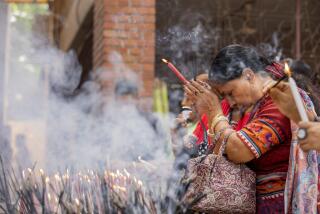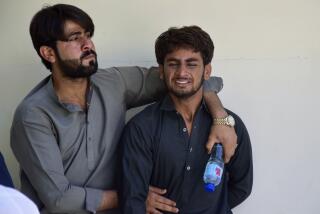2 Suicide Bombers Attack Courthouses in Bangladesh
- Share via
CHITTAGONG, Bangladesh — Two suicide bombers targeting courthouses killed at least seven people Tuesday in an escalating terrorism campaign blamed on Muslim extremists demanding an Islamic state.
Two police officers were among those who died in the blasts in this southeastern port city and Gazipur, 20 miles north of the capital, Dhaka. More than 50 people were injured, 20 of them critically.
The coordinated suicide bombings were the first in Bangladesh, where security forces have been struggling to stop increasingly sophisticated militant attacks and bring the masterminds to justice.
The first explosion Tuesday occurred around 9 a.m., when a bomber blew himself up at a checkpoint outside a court building in Chittagong as police scanned him with a metal detector. The two police officers were killed in the blast, and several others were seriously burned.
The bomber struck before most lawyers and judges had arrived for Tuesday’s sessions, said lawyer Shakwat Hossain. “If the bombers could have carried the things inside the court, it would have caused more havoc,” Hossain said.
Forty minutes later, a suicide bomber walked into the Gazipur district court’s law library, disguised in a lawyer’s black gown and tie, and detonated his explosives, killing himself and at least five others, said police sub-inspector Abdul Malek.
The bombers were suspected of being with the militant group Jamaat-ul-Mujahedin, which authorities recently warned was plotting suicide attacks to press its demands for an Islamic state governed by strict Sharia law.
“We don’t know how to control the situation if such highly powerful bombs are blasted by suspected suicide bombers,” said Chittagong district police Supt. Aftab Ahmed.
Most of Bangladesh’s 141 million people are Muslim, and most of them are moderates. But extremists have grown increasingly violent in recent months.
When Britain granted independence to the Indian subcontinent in 1947, what is now Bangladesh was part of the newly created Pakistan. Bangladesh, officially a secular state, broke away, with the help of neighboring India’s military, during a 1971 war.
The opposition Awami League, which led Bangladesh to independence, accuses the government of Prime Minister Khaleda Zia of supporting Islamic militants. Her Bangladesh Nationalist Party’s main partner in the coalition government is the Jamaat-e-Islami Bangladesh, which was banned until a prohibition against religious-based parties was lifted in 1979.
The Jamaat-e-Islami wants Bangladesh to be governed by Islamic principles established in the Koran. The group’s leaders insist they want to achieve their goals peacefully, but opponents accuse them of fomenting violence.
Bangladesh has banned three extremist groups that are believed responsible for militant attacks: the Jamaat-ul-Mujahedin, Jagrata Muslim Janata Bangladesh and Harkat-ul-Jihad-al Islami.
But the groups have threatened to assassinate politicians, judges and other leaders. In addition, Bangladesh has been rocked by a series of bloody attacks in recent months.
On Aug. 17, between 200 and 500 bombs exploded across the country over a few hours. The blasts, which killed two people and injured more than 100, were small and seen as a warning from the militants that they were capable of doing much worse damage.
A militant killed two judges Nov. 14, tossing a bomb in their minivan seconds after trying to hand them leaflets demanding Bangladesh be ruled by Sharia.
“Law framed by humans cannot continue and only the laws of God will prevail,” the leaflets said.
Three days later, a conference of the U.S. and other international donors warned in Dhaka that Zia’s government must move quickly to stop rampant corruption and growing militancy.
“We are concerned because such incidents happen only in a very unstable environment,” World Bank Vice President Praful Patel told reporters during the donors meeting. “And if you don’t do something about it very quickly, Bangladesh will become known more and more as a place of terrorism and violence.”
*
Times special correspondent Alam reported from Chittagong and staff writer Watson from New Delhi.
More to Read
Sign up for Essential California
The most important California stories and recommendations in your inbox every morning.
You may occasionally receive promotional content from the Los Angeles Times.










